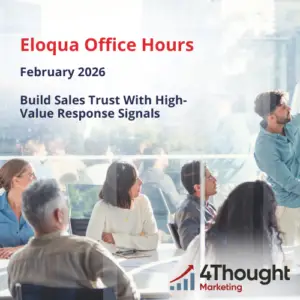
Every B2B marketing operation relies on data. Raw data often lacks context, accuracy, or the depth required for targeted actions. Data enrichment solves this gap by enhancing records with valuable, up-to-date third-party or internal information, turning basic profiles into smarter, more actionable insights for marketing teams.
In a marketing analytics context, data enrichment means supplementing contact or account records with details like company size, industry, buyer intent, social profiles, or compliance opt-in status. These additional fields help marketing operations filter and segment prospects, deliver relevant messaging, track buyer journeys, and measure campaign performance more accurately. Understanding and applying data enrichment is crucial for B2B teams trying to connect their marketing platforms, CRM systems, and analytics tools. With reliable, enriched data, teams can improve pipeline quality, target the right decision-makers, and reduce compliance risks.
Why Data Enrichment Matters for B2B Marketing Teams
After understanding what data enrichment is, it’s important to see why it has become a core part of B2B marketing success. Reliable, complete customer data enables marketing teams to deliver focused campaigns, meet privacy standards, and make faster, more informed decisions.
Benefits of Data Enrichment for Marketing Operations
- Improved Segmentation: Enrichment processes add firmographic and behavioral details to contact records, turning basic lead lists into well-defined segments. Marketing teams can group prospects by company size, industry, or intent signals, making outreach more relevant and effective.
- Enhanced Targeting: With a unified and updated dataset, marketers tailor messages to the right audience at the right time. Enriched data reveals job roles, decision-maker levels, and engagement history, cutting wasted spend on unqualified leads and increasing response rates.
- Better Lead Conversion: Sales teams benefit from accurate data about prospects’ needs and buying stages. Detailed records allow for faster lead assignment and personalized follow-up. This not only raises conversion rates but also makes handoffs to sales smoother.
- Stronger Privacy Compliance: Enrichment helps maintain compliance by identifying data gaps and verifying contact permissions. Consistently updated profiles support adherence to regulations like GDPR and CCPA while reducing the risks of misuse and errors.
Data enrichment can be managed manually or through cloud-based automation. Tools offered by consultancies help streamline enrichment, connecting external sources with marketing automation platforms. This creates an integrated, privacy-conscious approach that benefits both marketing effectiveness and compliance efforts.
Common Use Cases
Many B2B marketing teams encounter data gaps that block effective targeting, segmentation, and reporting. Data enrichment addresses these gaps by adding reliable, actionable fields to lead and account records. This expanded data drives better decision-making and supports advanced tactics across the marketing stack.
Personalized Campaigns
Enriched profiles empower teams to deliver more relevant messaging. When records include details like company size, industry, or recent engagement, marketers can tailor emails and ads for each segment. For example, knowing a lead’s job title and region lets you promote the right event or content offer at the right time, increasing engagement rates.
Account-Based Marketing (ABM)
ABM strategies demand accurate and complete account data. Data enrichment identifies which contacts belong to target accounts, fills in missing roles, and surfaces buying signals. This process helps prioritize the best-fit accounts and ensures personalized outreach to key decision makers. Enhanced intent signals or firmographic data also support cross-functional alignment between sales and marketing teams.
CRM Integration and Data Hygiene
Maintaining clean and complete data is a challenge for any CRM. It enables smoother integrations by standardizing fields, deduplicating contacts, and ensuring consistent formatting. Sales and marketing teams can rely on one source of truth, reducing confusion and wasted effort. B2B consultancies streamline enrichment and integration between platforms such as Eloqua, Marketo, and Salesforce, helping teams avoid manual work and system errors.
Other practical uses include audience suppression to meet privacy rules, scoring models based on enriched behavior data, and feeding real-time insights into marketing dashboards. Each scenario benefits from proactive enrichment, making campaigns more precise and operations less prone to error.
How Data Enrichment Streamlines Marketing Operations
Marketing operations often face roadblocks caused by poor data quality, duplicate records, and disconnected information between platforms. Data enrichment transforms these fragmented inputs into integrated, actionable datasets, making it easier for teams to focus on execution instead of fixing data issues.
Eliminating Inefficiencies With Enriched Data
Manual processes for managing and cleaning data are slow and error-prone. Automated enrichment services update lead and contact data at scale, ensuring accuracy on details like company size, industry, and valid contact channels. This reduces the time lost on list cleaning, manual research, and fixing incomplete records—freeing marketers to concentrate on campaign strategy.
Increasing Conversion Rates
Inaccurate or incomplete information leads to failed outreach and weak engagement. Enriched data helps marketers identify key decision-makers, segment audiences precisely, and tailor campaigns based on firmographics or behavioral signals. As a result, teams can create personalized journeys that move leads faster through the pipeline. This targeted approach consistently delivers higher conversion rates than broad, untargeted efforts.
Simplifying System Integrations
Disconnected marketing and CRM systems create bottlenecks for both reporting and handoffs. Data enrichment delivers unified, consistent profiles that flow seamlessly no matter which tool a team uses. Solutions like 4Thought Marketing’s integration of Eloqua and Marketo with leading CRMs allow information—such as updated opt-ins, intent signals, and segmentation tags—to move automatically across all platforms. This ensures every system has current, reliable data for lead management, reporting, and compliance.
With these improvements in place, marketing operations become more predictable, campaigns reach the right people, and reporting produces results teams can trust.
Best Practices
Effective data enrichment routines depend on precise execution and ongoing attention to detail. When marketing operations teams follow clear practices, they avoid common pitfalls like incomplete records, privacy breaches, or automation errors.

Select High-Quality Data Sources
Enriching your records starts with credible data providers. Consider these points when choosing sources:
- Review data accuracy and refresh rates—outdated or error-prone data harms campaigns.
- Assess provider reputation and compliance posture to ensure legal and ethical handling.
- Match enrichment fields to your segmentation and reporting needs, like industry, intent, or job title.
- Test samples before full-scale imports to check for data gaps or integration issues.
Prioritize Data Privacy and Compliance
Staying compliant with rules like GDPR or CCPA is essential. To support privacy in enrichment:
- Document consent and permissions for enriched records.
- Minimize unnecessary personal data—focus on relevant, non-sensitive attributes.
- Regularly audit data flows and retention policies to reduce risk.
Automate Enrichment and Monitor Data Quality
Manual enrichment cannot scale for high-volume B2B operations. Automate wherever possible using trusted platforms or cloud apps. Automation offers:
- Trigger-based updates to keep records current.
- Field mapping, deduplication, and standardization tools to maintain consistency.
- Built-in error alerts for missing or mismatched data.
Combining reliable data sources, strict privacy controls, and ongoing automation will produce actionable, trustworthy enriched data and support more agile B2B marketing operations.
How 4Thought Marketing Empowers B2B Organizations
Precise, reliable data forms the backbone of every successful B2B marketing operation. But as businesses scale, the challenge is not just gathering information—it’s making that information useful across complex technology stacks and evolving privacy rules. 4Thought Marketing focuses on helping organizations close the gap between raw data and actionable insights at every stage of the marketing lifecycle.
Expert Services and Consulting
4Thought Marketing offers tailored consulting to identify data quality gaps, architect automation solutions, and streamline integrations between platforms like Eloqua, Marketo, and major CRMs. Consultants provide guidance on everything from designing data hygiene routines to optimizing segmentation strategies, allowing B2B teams to stay focused on core campaigns rather than manual fixes.
Cloud Apps and Software Solutions
Through purpose-built cloud apps, 4Thought Marketing automates common data enrichment tasks such as deduplication, field standardization, and real-time updates from trusted external data providers. Marketers gain tools to segment audiences visually, monitor enrichment results, and maintain unified profiles across systems—all essential for consistent engagement and effective lead management. See available Cloud Apps
Data Privacy and Compliance Tools
Managing regulatory requirements becomes easier with solutions like 4Comply, which enables automated enforcement of privacy preferences and consent handling. These tools support ongoing compliance with laws such as GDPR and CCPA, reducing risk by tracking permission fields and automating audience suppression for non-compliant contacts.
B2B teams can lean on 4Thought Marketing for both operations expertise and practical technology. The result is faster campaign execution, higher lead quality, and sustained privacy compliance—all built on a foundation of enriched, ready-to-use data.
Choosing the Right Data Enrichment Solutions
With data enrichment now a core part of B2B marketing, selecting the right platform or partner is critical. The right tool should support your marketing goals, fit your existing tech stack, and simplify ongoing management. Consider these key points as you evaluate solutions:
Assess Your Marketing Challenges and Data Needs
Start by identifying which data gaps or workflow bottlenecks you need to address. Are you missing firmographic data for segmentation, struggling with CRM integrations, or facing compliance risks? Clarify these needs so you can focus on solutions that deliver direct improvements.
Check Compatibility With Existing Tools
Choose enrichment tools that integrate smoothly with marketing automation and CRM systems already in use. For most B2B organizations, this means platforms like Oracle Eloqua, Adobe Marketo, or Salesforce. Native integrations help avoid extra manual steps and reduce errors.
Evaluate Data Quality and Provider Reputation
- Review how often the provider updates their data.
- Check references and case studies for customer outcomes.
- Confirm adherence to privacy standards and local regulations.
Consider Scalability and Automation
Look for solutions that automate routine enrichment, deduplication, and field mapping. Automation is essential for supporting high-volume campaigns and long-term data hygiene. 4Thought Marketing offers consulting, cloud apps, and direct integrations that work with major platforms, helping teams resolve segmentation, privacy, and data management challenges with less overhead. Reach out to providers with proven B2B expertise to get tailored advice based on your industry and stack.
Frequently Asked Questions: Data Enrichment in B2B
Teams adopting data enrichment for B2B marketing face frequent questions related to security, ROI, managing enrichment processes, and fitting everything into daily operations.
Query: How Secure Is Data Enrichment?
Security is a top concern. All enrichment activities must use encrypted transfers, secure storage, and access controls. Work exclusively with providers who mirror or exceed your organization’s privacy standards. Review compliance with GDPR, CCPA, and local regulations. Cloud-based solutions minimize exposure by restricting the movement of sensitive information and providing regular audits.
Query: What Is the ROI of Data Enrichment?
ROI depends on how well the new data supports your segmentation, targeting, and automation needs. Teams often measure returns by tracking improvements in lead conversion rates, campaign engagement, and time saved on manual data tasks. As enriched data improves targeting accuracy, teams typically see faster pipeline movement and lower cost per lead.
Query: How Often Should Data Be Enriched?
Enrichment is not a one-time project. The best results come from automating updates at regular intervals—monthly or quarterly—based on sales cycles and database activity. Ongoing enrichment ensures records stay accurate through changes in buyer behavior, personnel, or company details.
Query: How Do You Manage Data Enrichment at Scale?
Automated enrichment, integrated with your marketing and CRM platforms, offers scale without manual effort. Use standardized field mapping and validation routines to avoid inconsistencies. Platforms and consulting expertise can help connect data sources, automate enrichment workflows, and monitor outcomes without disrupting daily operations.
By addressing these questions up front, teams create a clear framework for enriched data that supports secure, high-quality marketing operations.

Summary
Using enriched data is now essential for any B2B marketing team aiming to improve accuracy, speed, and compliance. As you focus on driving better campaign results and more efficient operations, use these steps to launch data enrichment within your team:
Plan and Align Your Data Goals
Set clear objectives before starting any enrichment project. Identify which areas—such as lead scoring, segmentation, or sales handoff—will benefit most. Work directly with stakeholders in sales and compliance to map goals and processes.
Audit and Prepare Your Data
Review current records for gaps and errors. Clean your database by removing duplicates and obsolete contacts. This lays a reliable foundation for successful enrichment and helps avoid passing inaccurate data into your downstream systems.
Select Trusted Enrichment Sources and Tools
Choose reputable data providers and enrichment platforms that match your use case and integrate with your marketing stack. Prioritize solutions proven in B2B environments—especially where privacy compliance is a factor. Consider automation tools to scale efficiently as your contact lists grow.
Integrate and Automate
Leverage software or cloud apps to automate the enrichment cycle. Align data mapping with your CRM and marketing platforms. Create processes for real-time updates and rule-based segmentation, reducing manual intervention and errors.
Monitor Data Quality and Stay Compliant
Set routines that regularly monitor for quality issues, track field completion, and update permissions. Ensure your data flows match regulations like GDPR or CCPA to protect your team from compliance risks. Proper documentation and consent management tools help maintain trust with your audience.
B2B teams often rely on partners such as 4Thought Marketing for guidance and technology stacks that speed up implementation and improve integration across systems. Specialist support can be crucial for managing complex environments, ensuring you can focus on growth and engagement while keeping your data reliable and compliant. Contact 4Thought Marketing for support
Launching a successful data enrichment program begins with clear planning and the right resources. Apply these steps to make your marketing operations more precise and automated—and ensure you’re prepared for changing market demands and regulatory shifts over time.





